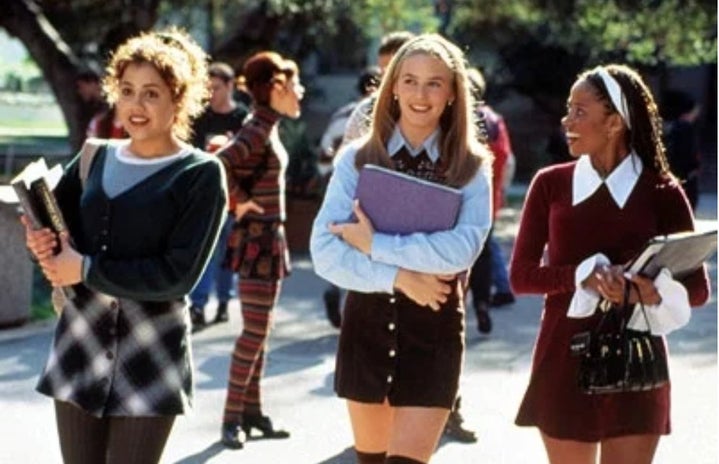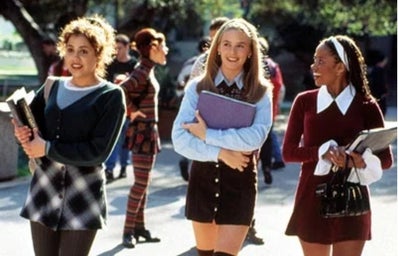Character tropes are essentially “stock characters” with certain traits and backstories that place them into boxes, conditioning audiences into subscribing to certain stereotypes. These characters’ storylines and personalities revolve around one or two selective traits and solely exist to further the leading (often male) character’s narrative. There is seldom any dimension to the characters and they’re pretty linear in their decisions.
- Manic Pixie Dream Girl
-
Have you ever come across a character in a TV show or movie who seems to only exist to aid the transformation of the male character? She has the quirks and the outgoing personality of a girl with the sun shining around her and looks like a daydream. She might have peculiar tastes in fashion and music, which make her stand out. It’s not considered weird or absurd, rather, it makes her lovelier in the eyes of the male protagonist. For example, Belle from Beauty and the Beast can be argued to be a Manic Pixie Dream Girl.
Now, the male protagonist, more encharmed with her than ever, sees the beauty in life and the ability to embrace all challenges, optimistically. Essentially, her reason to exist, at least in the way it’s depicted in narration, is diminished to simply becoming an aid to the male character. Thus, this character is written as a mere reductive and condescending male fantasy, which reveals the archetype’s latent misogyny.
This character may be hard to recognise as there are plenty of female characters that may have offbeat, or vivacious personalities, but that doesn’t make them Manic Pixie Dream Girls. They serve a real purpose for their own story and their significance doesn’t exist only in the mind of a male. An example would be Clementine in the movie, Eternal Sunshine of the Spotless Mind, as she is highly aware of how she is viewed as an add-on to men’s lives to relieve them of their pain or monotony or whatever they’re trying to escape and addresses that she’s just “looking for my own peace of mind. Don’t assign me yours.”
- “Strong” Female Character
-
The “strong” female character often saves the day with stereotypically male traits, while hiding any smallest hint of femininity. She’s heroic, brave, capable, confident, insanely attractive and never questioned. She’s the fierce, independent answer to the damsel-in-distress but is essentially a reductive cliche that has been scrubbed of any imperfections and possesses no real depth. Captain Marvel, for instance, is a prime example of the “strong” female character.
This character trope, common in superhero movies where the female character acts as a selling point, is essentially a shawdy job at female empowerment while actually doing nothing to create a character with depth. The cliche is mere pandering, or a marketing strategy to sell tickets. She’s a means for the makers of the film or show to say “Look, we respect strong women”. Such movies often only celebrate them when they display male traits, which unveils the underlying sexism.
But there are other characters who give an actual idea of female strength. Katniss Everdeen is driven by empathy and compassion and doesn’t suppress her feminine traits but uses them to her advantage. Other notable examples could be Moana from Moana or, more arguably, Rosa Diaz from Brooklyn Nine-Nine.
- Feministic Fervour F*cked Up
-
It’s fairly easy to spot this one–if a character’s main defining trait is that she hates men, is always angry and blames every man she meets for her problems, you have this cliché. Kat from 10 Things I Hate About You could arguably be an example. She is portrayed by the small-minded and large-egoed, or those whose manhood feels especially threatened by a woman standing her ground, as a so-called “feminazi”. She also smokes, to show that she’s all that’s wrong with society. Say, she doesn’t want children, then she’s obviously cold, selfish, materialistic, narcissistic, or otherwise fundamentally defective.
It is clearly very damaging to assume that a feminist woman is one of those “crazy” characters out to destroy the fabric of society and the sacred institution of marriage. This trope stems from the frequent misunderstanding of what feminism actually is; when feminists talk about how men are responsible for putting women down, they’re often referring to a historical precedent, the patriarchal culture, or even a specific individual; they don’t just “hate all men”.
- Trophy Hot Girl
-
This trope portrays a woman who, according to western standards of beauty, is extremely attractive, and also extremely stupid. Characters like Karen from Mean Girls, and Jill, Rachel’s sister in Friends, are examples of this. Her personality starts and ends with her appearance. She is portrayed as two-dimensional and only cares about her appearance. In the phrase “not like the other girls”, she is the “other girl”. This trope is just another way in which society pits women against one another. Add blonde hair to the character and voila, here comes the “dumb blonde”. While movies like Clueless and Legally Blonde have attempted to subvert this, they have caused only a small dent in the mammoth of this cliché.
Some better examples of well-rounded female portrayals that come to mind are Fleabag from Fleabag or the girls from Someone Great. Incidentally, one common thing between these two works is that both are written and directed by women. Fleabag (the protagonist has no real name) is witty, self-aware and deceivingly put-together. One would never tell she lost her best-friend and mother less than a year ago. A character with a well-carved out backstory and a unique perspective that has agency over her life, however messy it may be. The three main characters, Jenny, Erin and Blair, from the Netflix original Someone Great, while each have their own narratives, motives and weaknesses, display a strong sense of camaraderie and support the other women in the film rather than giving in to society’s crusade to constantly put women at odds with one another.
Women, as human beings and just like men, are far more nuanced than any trope: they’re more than just a label and should be portrayed as such in the media instead of being used as mere means to advance a man’s narrative arc. We see cliches standing in again and again for real human qualities and well-rounded characters. It’s important that we learn to recognize and call out such stereotypes when they’re being used as ways through which women continue to be belittled, undermined, or told they’re doing it wrong.


